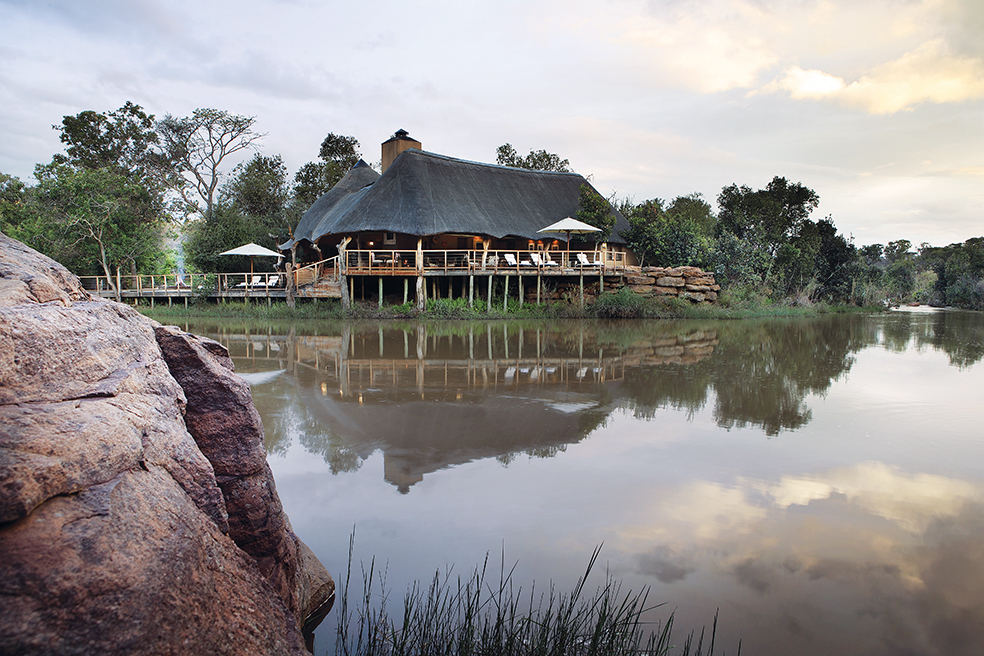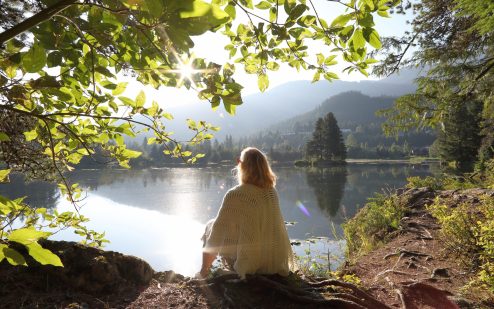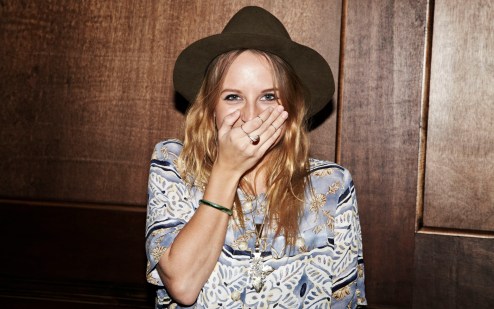How a trip to South Africa changed me
Nelson Mandela’s autobiography was the inspiration Amerley Ollennu needed to undertake what turned out to be a life-changing visit to South Africa

After a day on safari, I sat down to drink some tea and I thought it was the need for sleep that conjured the illusion of a small herd of elephants walking up to the pool of water in front of the Thanda Private Game Reserve bar. When those around me leapt up to get a closer look,
I realised it wasn’t my imagination, and as we watched them, I was so thankful for the gift I’d been given that past Christmas – for without it I surely wouldn’t have been there.
You see, I’ve never really wanted to visit South Africa. ‘But it’s beautiful’, ‘Cape Town is so much fun’, and ‘Going on safari is magical’; is what friends would say. Careful not to offend my wide mix of friends I’d attempt to explain how, as someone of mixed heritage (half Ghanaian, half German), I felt uncomfortable going somewhere where apartheid existed in my lifetime. I felt uncomfortable with the status quo, and I wondered where someone like me would fit in to the social landscape. Had opinions really changed? I’d heard mixed reports… but what did I know? Nothing, I admitted, as I’d never been.
The gift that changed my mind was Nelson Mandela’s autobiography, Long Walk To Freedom. Utterly humbled by his incredible life and inexhaustible ability to forgive and inspire the people of South Africa, black and white, I knew I had to visit this country with its painful and complicated past, and try to put my own reservations and assumptions to rest, too.
We started in Johannesburg, and spent a day touring the bustling city. Soweto first, home of the ‘matchbox’ house – our guide Vincent explained it was typical for six to 10 people to live in these small houses during the time of apartheid. Mandela lived in one before his time in prison. We visited his former home (rebuilt after it was set alight by vandals), filled with the original furniture, photos and pictures on the wall. It was like stepping back in time. My mind swam with thoughts of being enclosed in so small a space with so many others, and my heart sang out with the myriad things I have to be so incredibly grateful for.
As we left, we walked past a large plaque that bore Mandela’s Xhosa (his tribe) name, Rolihlahla, which translates as ‘troublemaker’. I laughed, realising that he was the best kind of troublemaker – challenging the status quo, fighting so hard to end such a brutal regime.
We also stopped at thought-provoking monuments like The Hector Pieterson Memorial and Museum, which honours children who lost their lives protesting against poor education, and the Freedom Charter. Everything we saw and learned touched my heart and gave me endless food for thought.
That evening, we drank exceptional local wines over our first African dinner at the Saxon Hotel, and I went to sleep, alone in a huge room larger than the matchbox houses we’d seen earlier. Comprised of more than 400 hotels in over 80 countries, The Leading Hotels of the World is a luxury collection, committed to providing remarkable travel experiences. Rooted in the locations where they are found, Leading hotels embody the very essence of their destination, perfect for the curious traveller looking for their next discovery. LHW hotels include former castles, palaces and monasteries, converted banks, safari camps, and private islands.
My first safari
The next day we headed north, to the Zulu Camp on the Shambala Private Game Reserve. Beautiful thatched lodges built in the style of traditional Zulu homes blend into the surrounding landscape. After a lunch fit for African chiefs, we went on our first safari. We drove along the bush as the sun set behind the Waterberg Mountains and the moon rose to illuminate the way.
We saw giraffes and wildebeests but it was lions we were really keen to spot. Sadly they evaded us, blending into the scenery of sandy soil and grass. Our guide, Dean, was optimistic – as it was winter the vegetation was thinner, so the lions couldn’t stay hidden for long.
Hopeful for a sighting on the next ride, we headed to the Nelson Mandela Centre for Reconciliation. This was Mandela’s old holiday home, built for him after his release from prison. Here he wrote Long Walk To Freedom, and held peace talks with politicians and influencers from around the world – Bill Clinton and Oprah Winfrey had both signed the guest book. Beautiful paintings of Xhosa women by Laura Fraser adorn the walls of the home, and, like the man himself, it’s far from ostentatious – natural wood, leather and thatch are used throughout. It opens up to a veranda overlooking a watering hole where we watched local wildlife visit for libations, too. We ate traditional South African fare that included chakalaka (a spicy vegetarian gravy) and pap (a maize-derived ‘porridge’). This felt like a home away from home and as we snuggled on sofas watching Mandela: Long Walk To Freedom on Mandela’s old TV, his presence was amplified.
The next night we found the lions. Driving slowly through the bush, Dean spotted a lioness in the grass. We sat in silence and awe, then another lioness approached, walking in front of us to nuzzle her friend. I was scared to be so close, but excited to see these beautiful animals in the wild. We were told not to stand up, as if we broke the shape of the car (which they’re very used to seeing) we could expect trouble. So we tried to contain ourselves as two large males approached. It was such a privilege to see these proud creatures roaming around Mandela’s homeland.
Conservation revelation
After two wonderful days, we flew east to the Thanda Private Game Reserve in the heart of Zululand, for more safari and to see how South Africans are coming together to save endangered animals. Set on a hillside, with breathtaking views, we stayed in a thatched bush suite. I didn’t want to leave my cabin, with bedroom, living room, log fire, indoor and outdoor shower, plus a vast veranda and plunge pool.
When I did, it was for more game drives with knowledgeable tracker Bheki Ngubane, who found impalas, lions, elephants, rhinos, giraffes and more. I will never forget watching young male lions larking around only to be moved on by two giant rhinos – they put on a bit of bravado, but soon scattered with their tails between their legs. To think that future generations could miss out on something like this is heartbreaking, and it powerfully highlighted just how crucial their conservation work is.
Despite the once-in-a-lifetime luxury of my trip (it costs a staggering £3,500 a night to stay at the Nelson Mandela Centre for Reconciliation) my time in South Africa wasn’t without its difficult moments – I witnessed racism, poverty, and learned about the problem of poaching, all of which deepened my understanding of this beautiful country. Most importantly, I learned that to close yourself off from places and experiences because of the opinions of a few is to miss out on the goodness and beauty of many. That’s the abiding picture in my mind – one I know Mr Mandela would approve of.
The lead-in rate for Saxon Hotel, Villas & Spa is R6,500 (approx. £325) per room per night. The lead-in rate for Zulu Camp at Shambala Private Game Reserve is R9,100 (approx. £455) per room per night. At the Nelson Mandela Centre for Reconciliation the lead-in rate is R70,000 (approx. £3,500) per night, for exclusive use only. The lead-in rate for Safari Lodge rooms at Thanda Private Game Reserve is £305 per night. Reservations for all can be made at lhw.com. British Airways flies twice-daily from Heathrow to Johannesburg. Return prices start from £681 in World Traveller and from £1,258 in World Traveller Plus. Visit ba.com/johannesburg
Photograph: Zulu Camp at Shambala Private Game Reserve









